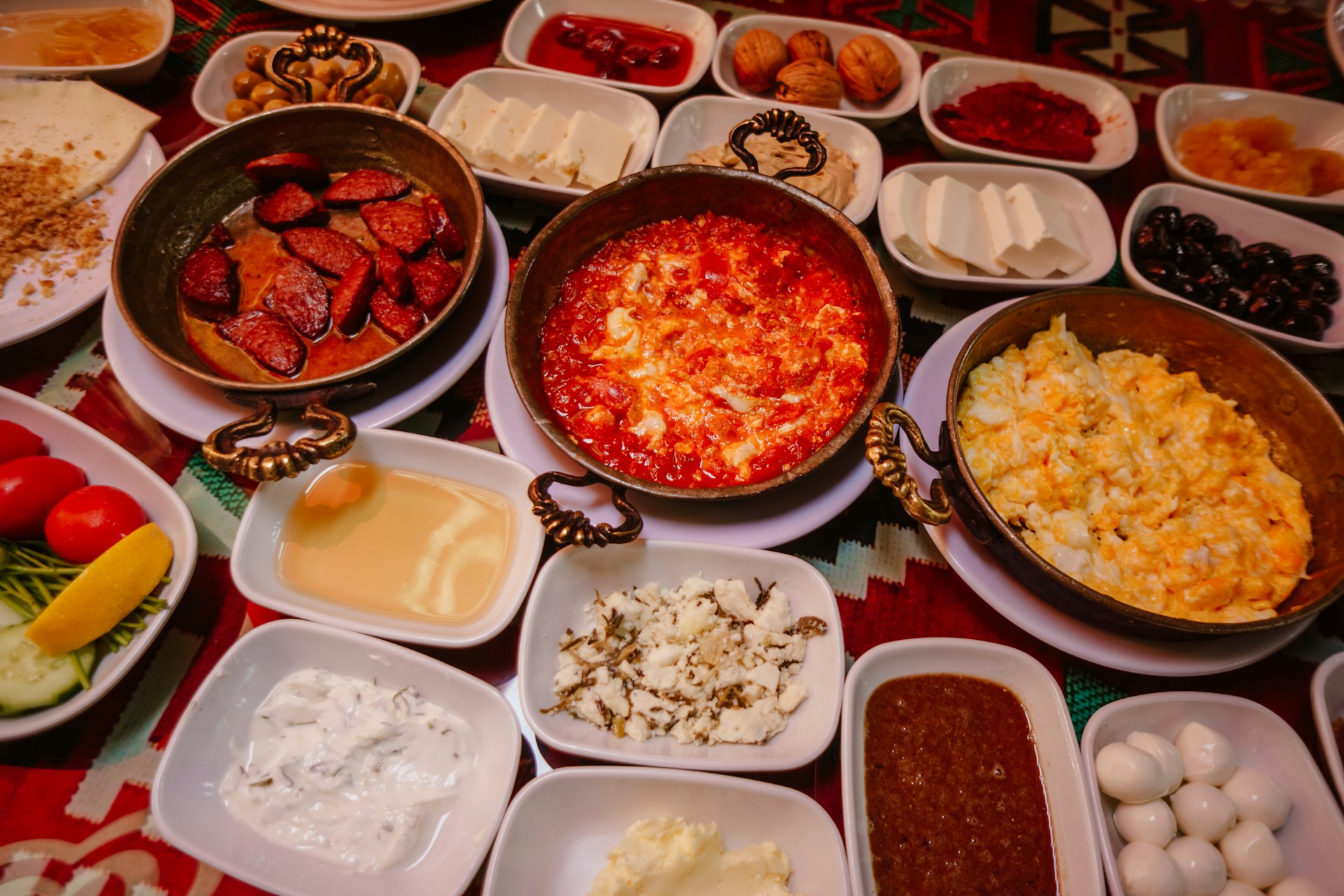In the United States, brunch is often seen as a social equalizer. It’s the meal where the hungover meet the early risers, all for the sake of spending around $15 or more on a small plate of waffles. The experience comes with its own rituals, like waiting patiently for someone to photograph their plate and deciding how much alcohol is acceptable before your Sunday is completely ruined.
In Turkey, however, breakfast, or “kahvalti,” is a daily ritual that holds as much importance on a Wednesday morning as it does on a lazy Sunday. Unlike the quick grab-and-go breakfast options in the U.S., Turkish breakfasts are more elaborate, with small portions of cheese, jam, eggs, and olives being the norm. For many Turkish families, including mine, weekend breakfasts are even more indulgent, with multiple pots of tea consumed before the bread basket is emptied.
Now, as an adult, kahvalti feels like a well-deserved break from the demands of daily life. It may not turn you into a morning person, but it will definitely set a positive tone for the rest of your day. If you’re interested in recreating this experience at home, here’s everything you need to know about preparing a traditional Turkish breakfast spread, even if you can’t make the trip to Istanbul.
Cheese: A Key Component
While Americans might associate brunch with waffles or bacon, cheese is an essential part of Turkish breakfast. Feta cheese, or “beyaz peynir,” is the most common variety, but it’s not the only option. Kasseri, a hard sheep’s milk cheese, and lor, a fresh goat’s milk cheese similar to cottage cheese, are also popular. My personal favorite is a stringy cheese from the Erzurum region called “civil peyniri.”
It’s important to note that a proper Turkish breakfast spread will feature more than one type of cheese. Usually, you’ll find at least two or three different varieties, offering a range of textures and flavors. Sampling the cheeses is an experience in itself.
Bread: The Foundation
The star of the Turkish breakfast is undoubtedly the bread. “Simit,” a round, sesame-coated bread often referred to as a Turkish bagel, is a staple. It’s widely available, sold by street vendors and in bakeries across Turkey. Simit is typically torn into pieces and paired with cheeses or jams, making it the perfect base for whatever toppings you choose. Affordable and portable, simit often serves as a quick breakfast on busy mornings.
Another bread option is “pide,” a soft, pillowy flatbread sprinkled with sesame seeds. This bread is particularly delicious when paired with olive spreads or cheese, making it a versatile component of the kahvalti table.
Jams and Spreads: A Sweet and Savory Mix
When it comes to spreads, Turkish breakfasts offer a delightful mix of sweet and savory options. A black olive spread, often spread on pide, is a popular choice for those who prefer something salty in the morning. On the sweeter side, you can try “pekmez,” a molasses-like syrup, often drizzled over tahini for a rich, nutty flavor.
Hazelnut spreads are another common addition to the breakfast table. Given that Turkey is one of the world’s leading producers of hazelnuts, it’s no surprise that Nutella and similar spreads are widely enjoyed.
Eggs: A Versatile Dish
No discussion of a Turkish breakfast would be complete without mentioning eggs. One of the most popular egg dishes is “sucuklu yumurta,” which consists of eggs fried with slices of “sucuk,” a spicy beef sausage. It’s a go-to meal for those mornings when you’re low on groceries or just looking for something simple yet satisfying. The best part of this dish is soaking up the spicy oil left over from frying the sausage with a piece of bread.
If you’re vegetarian, “menemen” is a great alternative. It’s a flavorful dish made with scrambled eggs, bell peppers, tomatoes, and onions, seasoned with oregano. For those who enjoy a bit of both worlds, it’s not uncommon to find a breakfast spread featuring both sucuklu yumurta and menemen, allowing you to enjoy a little bit of everything.
Drinks: Tea Over Coffee
For many Americans, brunch is synonymous with mimosas or other alcoholic drinks, but that’s not the case in Turkey. Traditional Turkish breakfasts are usually accompanied by tea, not coffee, and certainly not alcohol. “Cay” (black tea) is a breakfast staple in Turkey. The tea is served in small tulip-shaped glasses and is meant to be sipped slowly throughout the meal.
While herbal teas may be available in some restaurants, most Turks save these for the evening. The strong, black tea served at breakfast is a central part of the meal, with multiple cups enjoyed over the course of an hour or more.
The Takeaway
A Turkish breakfast is more than just a meal; it’s a ritual that brings people together around a table filled with a variety of flavors and textures. Whether you’re enjoying a simple weekday kahvalti or a more elaborate weekend spread, the combination of cheeses, breads, spreads, eggs, and tea creates a well-balanced and satisfying meal.
In a world where fast food breakfasts and grab-and-go options have become the norm, the traditional Turkish breakfast is a reminder of the importance of slowing down and savoring the moment. Whether you’re recreating this experience at home or fortunate enough to enjoy it in Turkey, kahvalti is a meal that nourishes both body and soul.




